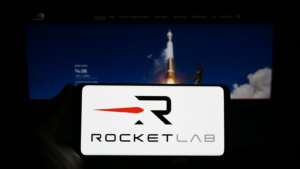The 3 Best Space Stocks to Buy in May 2024
The space arena is surging with innovation and technical accomplishments, spotlighting some of the best space stocks to buy. SpaceX broke the record in 2023 with 96 successful missions. More importantly for the long run, SpaceX performed them far more cost-efficiently than NASA ever did.
Although SpaceX is not a publicly traded company, it is the proverbial tide that lifts all the space boats. Trials and errors resulting in success have a way of disseminating. Research firm Spherical Insights forecasts a 16.21% global space exploration market CAGR between 2022 and 2032. It could then reach a $1.8 trillion market size.
Based on established performance, these are the best space stocks to buy, which will likely yield the most benefit for the new space era.
Boeing (BA)

Investors should first consider Boeing (NASDAQ:BA). Despite negative press recently, the company remains one of the pillars of America’s military might. As a space stock, together with Lockheed Martin, Boeing operates the joint venture United Launch Alliance (ULA).
The entity operates privately under the companies’ subdivisions of Lockheed Martin Space and Boeing Defense, Space & Security. Each holds a 50% stake. Although ULA has been speculated to go public eventually, it is more important to note its prospects.
Amazon (NASDAQ:AMZN) entrusted ULA to launch the majority of Amazon’s Project Kuiper satellite constellation. The project will be carried out by ULA’s Vulcan Centaur rockets to bring 3,236 satellites into Earth’s orbit for global broadband internet access. During this massive deployment, ULA will fine-tune its space infrastructure and cost-efficiency.
Outside of ULA and NASA involvement, Boeing continues to be a suppressed wide moat stock. At the present price of $178.35 per share, BA is 10.5% above the 52-week low of $159.70. While more whistleblower news keeps the sentiment down, following negative 30% year-to-date (YTD) performance, Boeing is to the U.S. industrial infrastructure what JPMorgan Chase (NYSE:JPM) is to the banking sector – too big to fail.
Rocket Lab USA (RKLB)

On the opposite side of the space spectrum, Rocket Lab USA (NASDAQ:RKLB) is a space penny stock*. As such, the value of RKLB shares are largely driven by launch news and partnerships. This is a dynamic similar to new drug launches, and prospective pipelines, for biotech firms.
Presently subdued, RKLB shares are down 25% YTD. From the 52-week low of $3.47, they are just 14.5% above at the present price level of $4.06 per share. This downturn was exacerbated in February. Rocket Lab USA’s share price plunged nearly 16% after the company announced it had launched a private offering of $275 million in 5-year convertible bonds. And that raised concerns about potential dilution among investors.
Nearing the end of May, Rocket Lab USA is set to launch PREFIRE 1 mission by NASA, as the first of two. PREFIRE’s satellites will look at Earth’s heat losses from polar regions, helping scientists improve climate modeling. So far, the company launched five Electron rockets this year with a 100% success rate.
Major bullish Rocket Lab news will rely on the company’s successful conversion of Electron rockets to make them reusable. This incoming milestone could ramp up cost-efficiency with previously flown rockets. Then the company should see more investment focus following the successful deployment of its new medium-sized rocket Neutron.
Although Neutron was expected to launch in 2024, the delays will likely set it for mid-2025 at the earliest. In this less exciting interim, investors can take advantage of discounted RKLB shares.
Virgin Galactic Holdings (SPCE)

Richard Branson’s Virgin Galactic Holdings (NASDAQ:SPCE)* is one of the few attempts at commercializing space flight. The company managed to successfully launch ten suborbital flights in total. These are intended for passenger flights, instead of inanimate satellite deployments. So, the expectations and requirements are much higher, underscoring its pioneering role in this high-stakes market.
Also, the company will launch Galactic 07 on June 8th. To aid in the next-gen Delta transition, Virgin Galactic Holdings can draw upon the capital from existing investors. Those include such names as BlackRock (NYSE:BLK), Vanguard Group and State Street Corp (NYSE:STT.) This Tuesday, Virgin Galactic Holdings will deliver Q1 of 2024 earnings results.
Ahead of the report, SPCE shares are down 57% YTD. At the present price of $1.03, they are 32% above the 52-week low of $0.70 per share. Nasdaq’s forecast consensus is currently aligned with $1 as the lowest estimate, while $2.5 is the average price target twelve months ahead.
*On Penny Stocks and Low-Volume Stocks: With only the rarest exceptions, InvestorPlace does not publish commentary about companies that have a market cap of less than $100 million or trade less than 100,000 shares each day. That’s because these “penny stocks” are frequently the playground for scam artists and market manipulators. If we ever do publish commentary on a low-volume stock that may be affected by our commentary, we demand that InvestorPlace.com’s writers disclose this fact and warn readers of the risks.
Read More: Penny Stocks — How to Profit Without Getting Scammed
On the date of publication, Shane Neagle did not hold (either directly or indirectly) any positions in the securities mentioned in this article. The opinions expressed in this article are those of the writer, subject to the InvestorPlace.com Publishing Guidelines.

